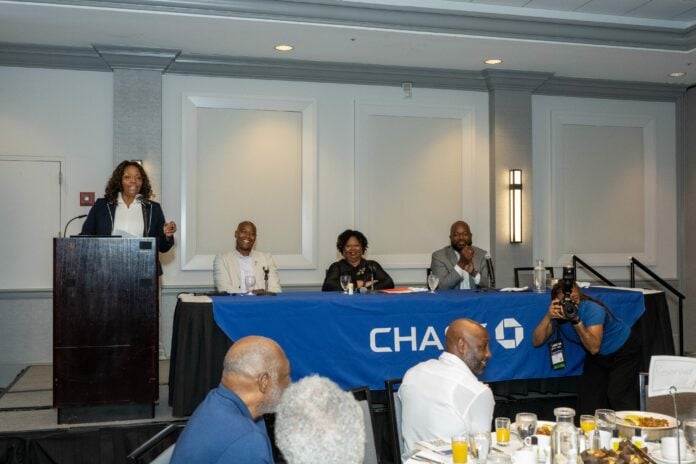
Helping small business owners achieve success is just one of the highlights of the 2024 NABJ Convention.
The 2024 NABJ Convention took place in Chicago July 31-Aug. 4. During the week of events, JPMorganChase sponsored a small business panel and breakfast entitled “Innovation and Inclusion: Keys to Small Business Success.”
The panel was moderated by Melody Cooper, president and general manager of Chicago’s WVON-AM, and featured guest speakers Caron Butler, Brenda Palms and Mikal Quarles, who discussed a variety of business strategies and programs that give people a second chance at their careers, thriving as a business owner, finding the right partners, and leaning into inclusion and innovation.
“A lot of times when we as an institution began to define underserved communities and underserved businesses, in some cases, it was just as simple as the folks that don’t have immediate access to the information,” said Qualres, head of community business strategies at JPMorganChase. “The more that we can make access to the information available, the more value that it has.”
Quarles leads business banking for the Midwest region and said it is imperative that underserved communities and small business owners have access to information and resources to help them succeed. This is the third year JPMorganChase has sponsored a small business panel at the annual NABJ Convention, and Quarles said they participated in these conversations even before they became an official sponsor.
“I was really blown away my first time of going to the event, personally, around the engagement and interaction of the participants in the program, which only made me more proud that we were doing the work that we were doing,” Quarles said. “So this gives us another forum to talk about the fact that small businesses are 77% more optimistic than most people would believe that they are.”
During the panel — which took place at 7:30 a.m. on Aug. 2 — Caron Butler, entrepreneur, two-time NBA All-Star and assistant coach of the Miami Heat, spoke about the importance of investing in the right people — whether that is who you surround yourself with or who you choose to work with.
“When you think about late stage, early companies and how they scale, one of the most important and valuable lessons I learned in the process is, good people,” Butler said during the panel. “At the end of the day, you invest in people, and people believe in a product, they believe in you, they believe in your leadership.”
Brenda Palms, founder and owner of the North Lawndale Employment Network, talked about the importance of diversifying her business and the ability to pivot, grow and stay in touch with her customers.
READ MORE: It’s Black Business Month: Here’s how you can support and celebrate
“Embrace the insights of your critics because they will help you see what you can’t see, and what your friends won’t tell,” Palms said during the panel. “Hold onto your impatience. Be okay with it, but also understand things take time. Honey is no good if it hasn’t cured long enough in the hive.”
There are three things Quarles said are essential to running a successful business that, unfortunately, many business owners, especially those of color, do not realize.
One, he said, is continuing to work on your business, not just in it.
“I think that sometimes the idea of working on your business is generically labeled as a business plan, and the business plan idea has kind of been tossed away,” Quarles said. “The truth of the matter is the business plan is a living breathing document, and it could be in multiple forms. It doesn’t have to be in PowerPoint, right? And with AI today, you could do it and measure it and continue to update it in a pretty simple and efficient way.”
Knowing the numbers and keeping good documentation is also essential, Quarles said. Many businesses ran into an issue with this during the height of the pandemic and had to change their approach.
Lastly, Quarles said business owners need to cultivate a relationship with their banks and bankers.
The more time clients spend with their bankers outlining their hopes, dreams, business opportunities and the models, the easier it will be for them to help you. This also extends to attorneys, lawyers and established professionals with insight outside of your normal business’ daily operation.
“You can’t call a friend when you need them if you never call them any other time, right?” Quarles said. “Philosophically, it’s just that simple. [If] your relationship with a bank or a banker is not established when the time of immediate need comes about, they don’t have the urgency because they don’t understand you or your circumstances.”
For more information about JPMorganChase or their Coaching for Impact program, visit chase.com/business/coaching-for-impact
Contact Arts & Culture Reporter Chloe McGowan at 317-762-7848. Follow her on X @chloe_mcgowanxx.
Chloe McGowan is the Arts & Culture Reporter for the Indianapolis Recorder Newspaper. Originally from Columbus, OH, Chloe has a bachelor's in journalism from The Ohio State University. She is a former IndyStar Pulliam Fellow, and has previously worked for Indy Maven, The Lantern, and CityScene Media Group. In her free time, Chloe enjoys live theatre, reading, baking and keeping her plants alive.




